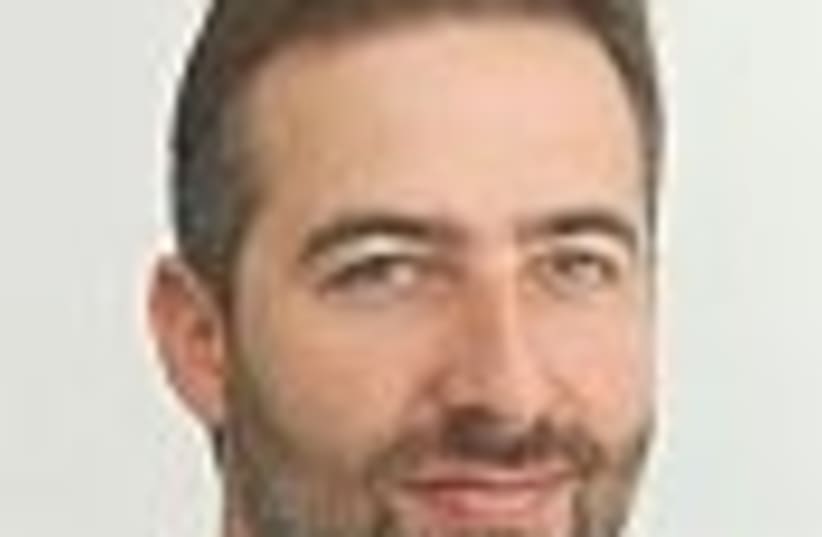Israel is a bike-size country. Not many realize it yet, but this country is made to order to embrace a sport that is growing by leaps and bounds. It is already happening on the grassroots level; the question is how long it will take our municipalities and ministries to catch up.
I know Israel is bike-size because last week I biked about half its length and twice across its breadth in just five days. Few of the 330 riders on the sixth annual Alyn Hospital charity bike ride were real athletes, yet we made it across the country from Beit Shean to Zichron Ya'acov in one day, and from Tel Aviv to Jerusalem in another.
Israelis like to get outdoors, and are discovering that biking is a great way to do that. There is a tradition of hiking in the land that is nurtured on school trips, in youth groups, in the army and by the very active Society for the Protection of Nature in Israel. Jeeps and other off-road vehicles are a well-known craze, but a very expensive one, and not one that offers a real sporting challenge. Now biking is increasingly being thrown into this mix.
The incredible growth of the Alyn ride, from 10 participants during its first run to 330 riders, is itself evidence of this. Other bike events are growing. The third annual ride for Etgarim, which promotes sports for the disabled, had an amazing 6,000 riders in a one-day event. An annual ride around the Kinneret in November enjoys a similar number of participants. Boaz Shahar, the editor of Ofanaim, Israel's cycling magazine, estimates that there are about 80,000 regular recreational riders in Israel today, and that number is growing every year.
THE QUESTION is when the infrastructure to support cycling - whether for sport, recreation, tourism or commuting - will catch up with the demand and potential. Currently, bike paths are almost exclusively a municipal affair. Tel Aviv is most advanced, with about 66 km. of paths, but even in this area there is much to be done to bring the network up to international standards. A few other cities have plans in the works, but Jerusalem - the capital, our largest city, and a beautiful area for biking - does not.
A petition being circulated online by the Israel Cycling Federation (www.ofanaim.org.il) is pushing for the Transportation Ministry to integrate bike paths into its budgets and plans. For NIS 30 million a year over five years, 300 km. of paths could be built from Haifa to Beersheba and from Tel Aviv to Jerusalem. This sum would be barely noticeable in the annual NIS 500m. road safety budget, or the NIS 1 billion budgeted yearly for constructing roads.
In the Washington, DC area where I used to live, miles of defunct train tracks were paved to make great paths for both hikers and bikers. This can be done here too. Even within Jerusalem, there are unused train tracks leading from near the center of town to the new train station at the Malcha mall. One might think that, for Israel Railways, which is trying to increase its own ridership, paving a path to its own station over its own unused tracks would be a no-brainer.
As far as I know, the only ministry to budget money for bike paths is the Environment Ministry - a token NIS 4m. to fund plans that municipalities might submit. Biking is indeed an environmental issue, not just as a non-polluting mode of transportation, but because few activities allow one to appreciate the countryside more than seeing it on a bicycle.
I've heard that, at least in the Jerusalem municipality, there is an attitude among key bureaucrats that biking is unsafe and should not be encouraged. It is hard to imagine a more head-in-the-sand approach. Bicycling will continue to grow. The only questions are how it can be made safe and enjoyable, and whether cities like Jerusalem will come to appreciate its potential both for tourism and for increasing residents' quality of life.
Recognizing that there is political hay to be made by nurturing the bicycling community, Tel Aviv Mayor Ron Huldai met the Alyn riders as they came into the city. It should not take a great degree of genius for other mayors to follow suit.
The more ways there are to pleasurably appreciate the beauty and history of this country, the better it will be for our environment, and even for our national pride and identity. With a relatively small amount of thought and effort, Israel could become a world-class destination for bicyclists and, in the process, provide a new outlet for locals of all ages (many people are now taking up biking in their 50s and 60s) to, as God said to Abraham in this week's Torah portion, go out into their land.
saul@jpost.com
- Editorial Page Editor Saul Singer is author of the book, Confronting Jihad: Israel's Struggle & the World After 9/11
